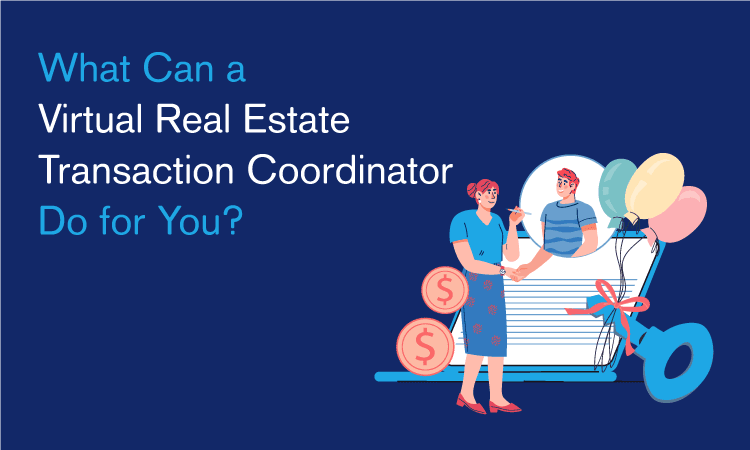Being a real estate agent is tough–it comes with a lot of responsibility, and being an agent can be pretty stressful. Real estate agents must handle plenty of things, and it can be difficult to keep everything straight. That's why all agents would benefit from having a real estate virtual assistant or a virtual real estate transaction coordinator. Here’s what an agent has to deal with daily:
Finding clients
Real estate agents rely on finding new clients to make money. This can be difficult, as there is a lot of competition in the industry. Agents have to work hard to stand out from the dozens of other real estate professionals to attract potential buyers and sellers. A decade or so ago, if you had an online presence, you had an edge. Today, though, everyone has a social media account–it’s much harder to make a mark on potential clients.
Showing properties
Finding a client is just the first step. Once an agent secures an interested party, they have to find properties that fit the latter’s needs. Finding the right property can be time-consuming–often, agents have to show several ones before the client finds one that checks all the boxes.
Negotiating
Once the client and agent zero in on a property, the agent has to negotiate with the seller on behalf of their client. This can be tricky, as agents need to get the best possible price for their clients while also ensuring that the deal goes through.
Paperwork
This is one of the most tedious and time-consuming parts of being a real estate agent. Transactions involve a lot of paperwork, and agents have to make sure that all of it is in order, all documentations are complete, and that everything is signed correctly. An agent without a virtual real estate transaction coordinator will spend most of their time on these tasks.
Dealing with difficult clients
Finally, not all clients are easy to deal with. Some can be very demanding, and others may change their mind frequently. Agents have to be patient and understanding, even when dealing with difficult clients. However, resolving client issues often takes up a lot of time and takes away from other responsibilities.
Having a real estate virtual assistant is a game changer for most agents. A real estate VA keeps agents productive by taking on tedious, time-consuming tasks like paperwork related to closing a sale. Transaction coordinators are a type of real estate virtual assistant who specializes in the escrow process. If real estate VAs handle marketing and social media for your practice, a transaction coordinator takes care of things like ensuring that the earnest money is in escrow on time or monitoring deadlines for paperwork.
Whether you’re getting a real estate VA or a transaction coordinator, having either will be a game changer. A real estate agent shines when they're talking to people. Having a VA or a transaction coordinator lets them focus on that instead of the admin tasks necessary to keep the business running.
Why You Need a Real Estate Transaction Coordinator
Transaction coordination is the process of organizing and managing all of the tasks involved in a real estate transaction. This includes everything from finding clients and showing properties to negotiating deals and handling paperwork. Transaction coordinators help to keep everything organized and running smoothly.
There are a few different reasons why you might need a transaction coordinator. First, if you're an experienced agent who is looking to take on more clients, a transaction coordinator can help you manage your transactions and free up your time.
Second, if you're a new agent who is still learning the ropes, a transaction coordinator can be a valuable resource. They can help you learn about the process and make sure that everything is done correctly.
Third, even if you're an experienced agent who doesn't plan on taking on more clients, a virtual real estate transaction coordinator can still be helpful. They can take care of the paperwork and other tasks involved in a transaction so that you can focus on being the best agent for your clients.
Should You Hire a Virtual Real Estate Transaction Coordinator?
By hiring a transaction coordinator, you can free up time to do what matters most. You'll have less trouble with paperwork and more energy for marketing your home or business! By using a real estate transaction coordinator, you can free up 13-16 hours of work to do other things like meet clients and make demos.
Note, though, that hiring a transaction coordinator means more operating expenses for your business. The average salary for a full-time, in-office coordinator in the U.S. is approximately $45,000 per year, but rates will vary depending on experience and location.
You'd be more cost-efficient by hiring a virtual transaction coordinator. Virtual coordinators are contractors, so they're freelance workers. Since you aren't paying for overhead, like office space and equipment, or your virtual coordinator's benefits, you stand to save thousands of dollars that you would spend if you hired a full-time employee.
What Can a Virtual Real Estate Transaction Coordinator Do?
A transaction coordinator is a valuable asset for any real estate agent. They keep things organized and running smoothly. If you're looking to free up your time or learn about the process, a transaction coordinator is a great resource. Below are just some of the tasks that a real estate transaction coordinator handles for clients.
Handling and managing buyer and seller contracts
One of the main responsibilities of a virtual real estate transaction coordinator is being the point person for ongoing contracts. A transaction coordinator updates and maintains the agent's email and other communications to lenders, clients, agents, title officers, and others pertinent to the sale.
They also document communications by sorting emails into labeled folders and forwarding urgent communications to the agent. A transaction coordinator will also coordinate the final walk-through for the buyer and his/her agent before closing.
Before the closing, a transaction coordinator also audits the file to ensure that all paperwork and tax withholding exemptions are complete. Besides this, they will provide summaries to all relevant parties on the status and deadlines of the transactions.
Reviewing and proofreading contracts
Buying a property is a long-winded process. It is also delicate, and it's always in everyone's best interests to stay protected throughout. For most top-notch agencies, quality control is baked into each stage. This ensures nothing bad happens, or that incidents are immediately resolved.
Transaction coordinators are an important part of quality control. They pore through contracts and documents, looking for missing signatures, information, or requirements before forwarding the files. It is a real estate transaction coordinator's job to be sure that the buyer, seller, and everyone involved in the sale is compliant with local regulations.
Real estate transaction coordinators also handle all the data and information in a transaction. They are in charge of updating the client database and preparing disclosures within DocuSign, dotloop, or other similar software.
Handling other communications
Besides taking care of new client intake and closing contracts, a real estate transaction coordinator acts as a liaison for other matters. They will contact lenders for appraisal orders, coordinate closing dates, times, and locations with all relevant parties, and be the agent's main point person throughout the transaction.
The coordinator also monitors the timeline for an agent's properties and sends follow-up emails when appropriate. They coordinate various tasks, including inspections, negotiations for repairs, and completion of repairs.
Besides these, coordinators also handle recruiting calls, inbound sign calls, lead cultivation follow-up calls, and inquiries for appointments and listing availability. They also maintain customer relationship management databases, adding networked leads to these tools and updating contact information as necessary.
Accomplishing closing tasks
When a transaction closes, the coordinator must also take care of certain admin tasks. These include scheduling follow-up calls to the client, in 30, 90, and 120-day gaps from the date of closing. This happens for several reasons. First, the client could need recommendations for home improvement providers. They might also have questions they didn't ask about the surrounding area and neighborhood.
The after-sales period can be full of possibilities. Besides solidifying your reputation as a real estate agent, it is an opportunity to secure referrals from this client and increase business opportunities. Transaction coordinators are a vital part of keeping that line of communication alive with your clients long after the sale closes.
Tools a Virtual Real Estate Transaction Coordinator Uses
You might be wondering how a virtual real estate transaction coordinator would be able to accomplish all of these things, given that they work online. It's simple; they use software and systems that allow them to work remotely. Below are some tools your remote real estate transaction coordinator would use.
- Transaction management platforms – Transaction management platforms are software that helps automate the closing process. They provide a workspace where all the people involved in the transaction can communicate and collaborate, as well as a place to store all the necessary documents. Most platforms also include an e-signature feature, which allows you to sign documents electronically. This can be helpful for transactions that involve multiple parties located in different locations.
- Title enclosing software – Some tools, like DocuSign, capture e-signatures in addition to handling, securing, and automating real estate agreements.
- Video conferencing tools – Zoom allows for video conferencing between two or more people. This can be helpful for preliminary meetings before transitioning everything into a transaction management system, or if the agent's current transaction management system does not support video conferencing.
- G Suite – This is a set of productivity tools that include Gmail, Calendar, Drive, Docs, Sheets, and Slides. These cloud-based software allow for file organization and easy sharing and communication between remote team members.
- Graphic design tools – Canva is software that many real estate VAs use to create materials. On it, they can make everything from invites to open houses to social media content and even after-sales follow-up cards. Graphic design tools are more in the wheelhouse of real estate VAs, but if your transaction coordinator can use Canva or other creative studios, it is certainly a big plus.
Hire a Virtual Real Estate Transaction Coordinator
Closing a sale consists of several small tasks, ones that take up a large part of the workday. Real estate agents who hire transaction coordinators don’t have to worry about the finer details of escrow. With an expert on the transaction process on board, you’ll feel confident that your clients will have a smooth transition from buyer to owner in no time.
Hire your virtual transaction coordinator from Wing. Schedule a call today and learn how our assistants can help you build a better real estate business!
Aya is Wing Assistant’s blog manager. When she’s not wrangling content briefs, editing article drafts and handling on-page SEO, she is crafting messages for Wing’s other communication materials. Aya writes about SaaS startups, marketing for startups, search engine optimization, and pop culture.






